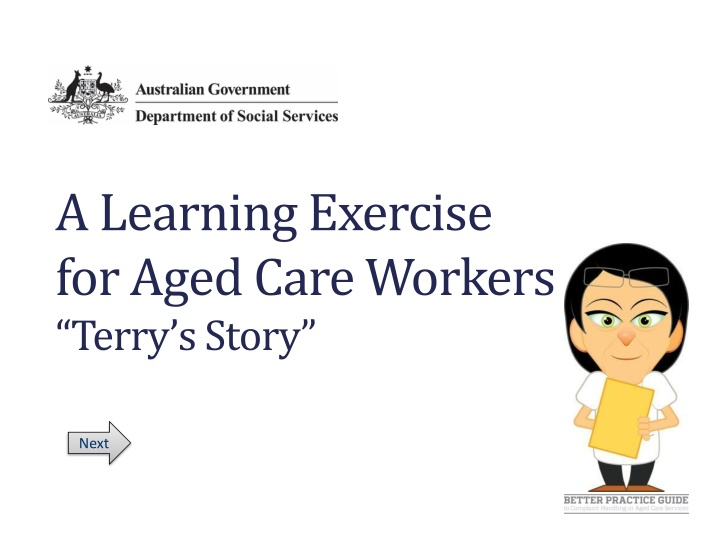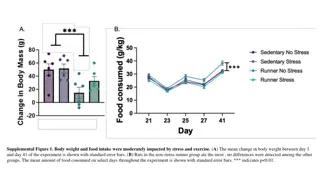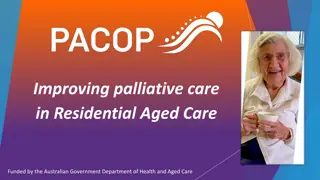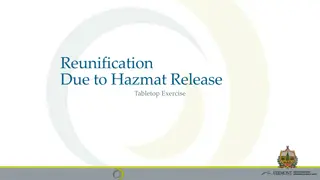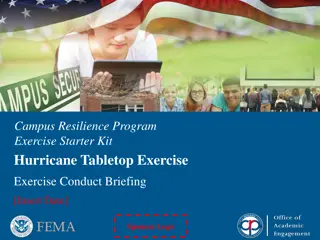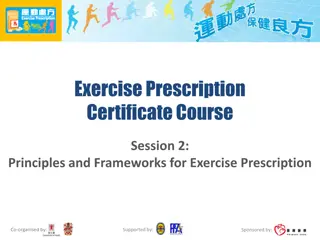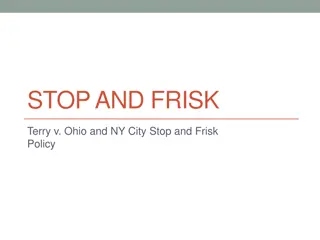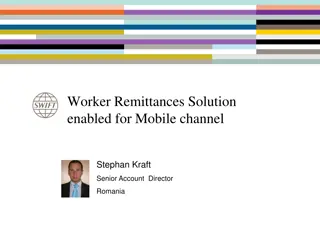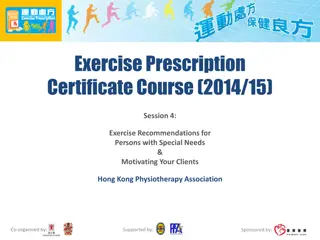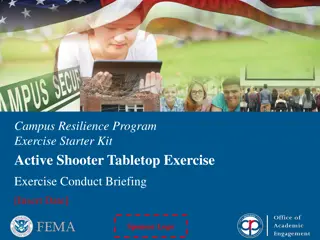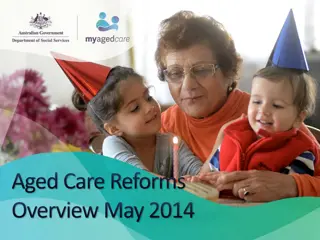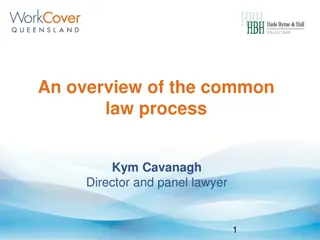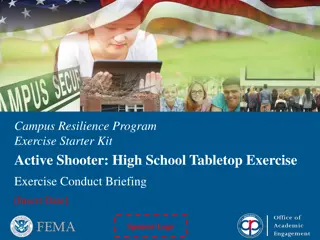Aged Care Worker Learning Exercise - Terry's Story
Join Terry, a 79-year-old care recipient in an aged care service, as you navigate through a scenario addressing complaints about food taste. Learn to handle feedback sensitively, manage expectations, and escalate concerns appropriately in this interactive exercise tailored for aged care workers.
Download Presentation

Please find below an Image/Link to download the presentation.
The content on the website is provided AS IS for your information and personal use only. It may not be sold, licensed, or shared on other websites without obtaining consent from the author.If you encounter any issues during the download, it is possible that the publisher has removed the file from their server.
You are allowed to download the files provided on this website for personal or commercial use, subject to the condition that they are used lawfully. All files are the property of their respective owners.
The content on the website is provided AS IS for your information and personal use only. It may not be sold, licensed, or shared on other websites without obtaining consent from the author.
E N D
Presentation Transcript
A Learning Exercise for Aged Care Workers Terry s Story Next Next
Instructions This exercise presents a common type of complaint that you may encounter as an aged care worker. The exercise is a choose your own adventure presentation designed for you to complete at your own pace and in your own time. Some slides will ask you to STOP and think. Some slides will ask you to choose your response to a situation or describe the next step you would take. Move from slide to slide by clicking your mouse or using the arrow keys on your keyboard. Next Next
Terrys story Terry, 79 years old, is a care recipient in your aged care service. Last month, Terry mentioned to Igor, the head chef, that the curry prawn dish had no taste. Igor was a little hurt by Terry s complaint about his signature dish. What is your next step in addressing Terry s concern? You address Terry s concern right away and request that extra chilli be added to the curry prawn dish. You thank Terry for his feedback and escalate the complaint through the service s complaints procedure. You address Terry s concern right away and request that extra chilli be added to the curry prawn dish. You thank Terry for his feedback and escalate the complaint through the service s complaints procedure.
Terrys Story You re very committed to making sure the residents of your service are happy with the food served to them. You discuss the issue with Terry and confirm the amount of chilli he d like to be added to the dish. You ask Igor the chef to add extra chilli to the curry prawns dish on the menu. What kind of outcome do you think this approach may produce? Next Next
Terrys Story Terry is happy that his problem was taken seriously and addressed. The dish now suits his taste. However, a number of other residents start complaining to Igor that the food is now too spicy. What are other ways that Terry s concerns could have been handled? Next Next
Terrys Story Your service is now managing a number of complaints about spicy food and staff are feeling stressed. You acknowledge that the intention was to resolve the complaint directly, however your manager is disappointed that you did not escalate Terry s feedback as a complaint. Refer to the Better Practice Guide to learn more about recording and documenting complaints (page 13) as part of a complaint handling process (page 12). Could you have addressed Terry s concerns in a different way? Next Next
Terrys Story You thank Terry for his feedback and apologise that the curry prawn dish has no taste. You recognise that all feedback is important and that each complaint needs to be acknowledged, treated seriously and resolved. The complaint may also be a sign of a systemic problem that is impacting other residents. How could you establish if other residents have the same concerns as Terry? Next Next
Terrys Story You inform Terry that you will follow up on his feedback through the service s complaint procedure. You let him know that he can expect a response within 48 hours. Terry is happy that his concerns are being taken seriously. As the complaints manager, what is your next step in addressing Terry s concerns? You set up a one-on-one meeting with Terry to clarify his concerns directly. You set up a one-on-one meeting with Terry to clarify his concerns directly. You set up a meeting between yourself, Igor the chef and Terry to discuss Terry s concerns. You set up a meeting between yourself, Igor the chef and Terry to discuss Terry s concerns.
Terrys Story You arrange a one-on-one meeting with Terry to discuss his concerns. Terry s feedback is that the food needs to be more spicy. After the meeting, you request that changes be made to the dish based on Terry s feedback. Using this approach, what could the outcome to Terry s concerns be? Next Next
Terrys Story Igor the chef is instructed to add more spice to his dishes. While Terry is happy that the meals now have more spice, several other residents are complaining to management about the food suddenly being too spicy. What could the impact of the additional complaints be on staff like Igor? Next Next
Terrys Story Igor is offended. He feels like his signature dish is being criticised. Staff are unhappy and feel disempowered as they were not consulted in the process. Several other residents have started complaining about the food. Could consulting with other staff and residents have resulted in a different outcome? Next Next
Terrys Story You set up a meeting with Terry and Igor the chef to discuss Terry s concerns with the food being served. You asked Terry a number of questions, involving Igor, to discuss aspects of his prawn dish. You discover Terry s issue is not that the dish has no taste but rather that Terry prefers meals to have more spice. What is your next step? You survey other residents in the service to find out their thoughts on the food being served. You request that more spices be added to the curry prawns to address Terry s concerns. You survey other residents in the service to find out their thoughts on the food being served. You request that more spices be added to the curry prawns to address Terry s concerns.
Terrys Story Igor was pleased that he was involved in the discussions to understand concerns about the food he is serving. Igor was happy to learn that the issue was a matter of preference, rather than a complaint about his cooking. After the meeting, you instruct Igor to add more spice to his dishes for all residents. Terry is happy with the outcome as his preference for spicy food is acknowledged and catered for. What impact, if any, could this approach have on other residents in your service? Next Next
Terrys Story Several other residents have started complaining about the food. The service is now managing a number of complaints as a result of the food being overly spicy. Other kitchen staff are also feeling stressed from the number of dissatisfied care recipients they are dealing with. How could you have changed your approach to avoid other residents becoming unhappy with the food being served? Next Next
Terrys Story Having established that the issue is a matter of preference you wonder if this issue could be affecting other care recipients in your service. You understand that if this is not dealt with appropriately and quickly, what started as a preference could become a complaint down the track. You organise an anonymous survey to establish residents food preferences and to invite any feedback and suggestions. How can surveys help you and your service to improve care and services for care recipients? Next Next
Terrys Story You set up a meeting with all kitchen staff to talk about the survey findings. The results indicate that several residents would like spicy options on the menu. Igor the chef suggests setting aside some sauce and adding more spice for those who prefer hotter dishes. Igor the chef starts offering residents two options to cater for different preferences - a spicy option and a standard option. What could the outcome of using this approach be for Terry, and for other care recipients? Next Next
Terrys Story Several weeks later you follow up with another anonymous survey. Residents are happy they now have an extra option to suit their food preferences. Many of them share the good news with their family and friends, creating positive word-of-mouth for your service. The kitchen staff are happy that they were involved in the process of reaching a positive solution and that residents are happy with the food being made. Refer to the Better Practice Guide about using complaints as an opportunity for the continuous improvement of your service (page 24). Next Next
Thanks for completing this exercise. This learning exercise is part of the Better Practice Guide to Complaint Handling in Aged Care toolkit for the aged care industry. Find the toolkit at health.gov.au/agedcarecomplaints
